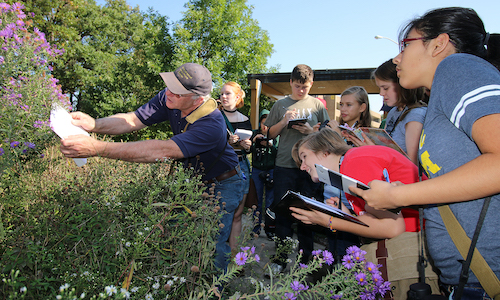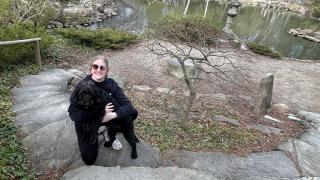
Frequent family trips to natural areas inspired Rick Simek’s appreciation of the outdoors. His parents would point out interesting birds. And he’d go exploring with his siblings.
“Mom and dad would pack a sunrise picnic. After breakfast, we’d look for nests or anything else we could discover,” he said. “It was one of my favorite things. Growing up in Detroit, I was surrounded by the sights and sounds of the city. But, with just a little bit of travel, we were able to explore nature.”
Simek said that experience—having nature accessible even when living in an urban environment—affected the trajectory of both his life and career.
And the Environmental Interpretative Center (EIC) natural areas manager and program supervisor hopes he’s doing the same for others.
“This place is an oasis in the middle of an urban area. You don’t have to drive two hours to go to the woods and waters up north. You can come here, relax and unwind or share it with your family and have a multigenerational experience,” he said. “As soon as I stepped on campus for my interview [with Biology and Environmental Studies Professor and EIC Founding Director Orin Gelderloos] more than 20 years ago, I was inspired and wanted to create ways to share it with our community.”
Simek, during his nearly 25 years with the university, has developed programs for community involvement, expanded existing offerings, managed the community organic garden, led interpretive programs, created new field trip options for area schools—12,000-15,000 school children visit the EIC annually—and more.
Simek is driven by the curiosity people have, especially kids, when discovering plants, animals and insects. On bird walks, he’s seen birds that migrate up to our region from the rainforests nesting in the trees. And, with the honeybee hives on campus, he’s given community residents the chance to act as a beekeeper.
“With preserving this area, the university has given people—myself included—direct access to hands-on personal experience with nature. It is truly one-of-a-kind. Something people might only otherwise see on TV or read about, they’ve been able to see or do here,” said Simek, who worked for Cranbrook Institute of Science and the Huron-Clinton Metroparks before UM-Dearborn. “We want people to connect with what they can find outdoors. I guess you could say it’s my passion.”
And that passion only grows as he sees others find a love of the great outdoors.
“Doing this for so long, I’ve seen the progression of a grade-school student who has come to the EIC on a field trip, who later came to the university as a college student, and was then inspired to go out after graduation and get others excited about discovering and preserving nature through a career,” he said. “It’s a very cool thing to see and I am so grateful to have been a part of it.”





